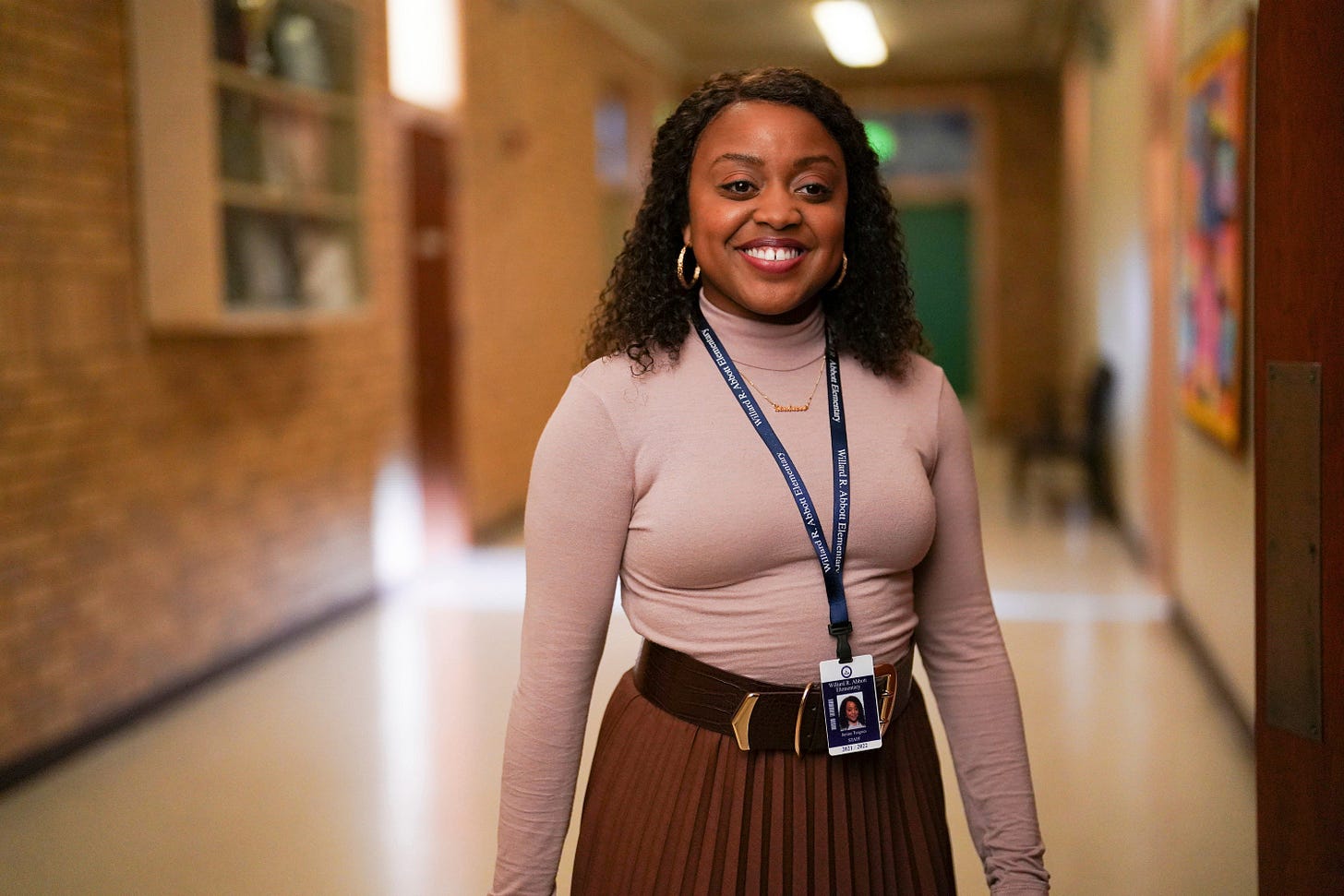How we affect our kids, one gaffe at a time
We have more impact on kids than we think
You might have noticed I use a lot of TV to inform what I write about here. I wish I could cite the research, but this means that I’m like a lot of people, and a lot of children actually. I internalise and integrate lots of knowledge from all sorts of sources to make sense of my world. That’s what I’m going to write about here after watching an episode of “Abbott Elementary”.
"Abbott Elementary" is a mockumentary sitcom, like "The Office" but in a Philadelphia school. It follows a bunch of passionate teachers, led by the ever-optimistic Janine, trying to make a difference at a struggling inner-city school.
Think awkward staff meetings and overzealous lesson plans – but also tackles real issues faced by educators, from lack of funding to a system that often feels stacked against them—maybe you can relate.
How we can forget who’s important
"Abbott Elementary's" season one finale, "Zoo Balloon," takes us on a school trip to the zoo. Beneath the animal encounters lies a powerful message: the profound impact adults, without self-awareness, have on the children they guide.
At first glance, the episode focuses on the teachers' personal lives. Janine wrestles with a potential move to New York with her partner Tariq, while veteran kindergarten teacher Barbara contemplates retirement after learning her beloved tuatara has been, well, put out to pasture. These relatable struggles offer a glimpse into the complexities of adult life for the students. The real gem lies in how the episode subtly highlights how our behaviour shapes young minds.
The episode doesn't shy away from portraying the negative consequences of lacking self-awareness. Janine's initial indecisiveness creates uncertainty for the students, mirroring the importance of clear boundaries and strong role models. While her colleague is struggling with a child who is worried about his transition into second grade, Janine is supposed to be modelling security for him, but she is so distracted by her own fear of change that she confuses Kenny further. Barbara’s distress and overidentification with the tuatara distracts her from overseeing the class, and pulls in Janine who is also distracted. This leads to Kenny going missing for a while.
"Abbott Elementary" reminds us that children are constantly observing and absorbing the behaviour of the adults around them. The show emphasises the need for teachers, parents, and mentors to be mindful of their actions, choices, and even unspoken emotions. It's a powerful reminder that even on a seemingly light-hearted day at the zoo, the way we "show up" can have a profound impact on the young minds we shape. Can you think of a time where you were distracted by your own personal feelings or dramas, and how it fed into your dynamic with a young person under your care?
This isn’t to guilt you: I work with young people too. We cannot help being humans at the end of the day, with a lot of complex emotions, our own lives going on, and our own reactions to the children in the room. I want us all to get better though.
So, what can I do?
Here are some ideas.
Know yourself: Regularly check in with your emotions and stresses. How might they affect your interactions with young people?
Get a chat on: If you're having a tough time, talk to someone you trust—mate, family, therapist, whoever. Don't be afraid to ask for help or take some time for yourself.
Keep your cool: Show kids healthy ways to handle stress and tough emotions. Could be breathing exercises, mindfulness, or just talking openly about feelings.
Be clear, be fair, talk it out: Stick to your rules and follow through. This helps kids feel safe and secure. Behaviour policies be damned: don’t expect fealty from your children. You are training the next generation of adults. Adults shouldn’t fawn in the gaze of authority. When young people question you, encourage them to do it respectfully. Explain your decisions in a way they'll understand. This builds trust.
Be present: When you're with kids, give them your full attention. Ditch the phone, listen, and engage. If other children are trying to call your attention away, reassure the child in front of you that you are listening. If you think this might be a longer conversation, make the time at a later point. Make a safe space: let them know it's okay to express emotions and ask for help.
Big up the small wins: Celebrate their efforts, even mistakes. This builds confidence.
Remember your face says it all: Even when you're not talking, your expressions, tone, and body language speak volumes to kids.
Forgive yourself: Everyone slips up. If you've been distracted, say sorry and try to be more present.
Seek supervision: If you are a professional working with children, I can’t underline this enough. Working with children and young people is hard. Doing it without a sounding board is close to impossible. Regular supervision should cover everything, not just your teaching outcomes.
Can you help me?
Sure. Make a time to talk with me. We can go over approaches to working with children, or just talk about how you are feeling or any specific challenges. My door is open.
Please get in touch:
Final thoughts
The tips I've shared are just a starting point. It's about finding what works for you and the young people in your life. It's about building genuine connections and fostering healthy relationships.
Remember, we're not just shaping young minds, we're shaping the future. So, let's do it with kindness, empathy, and a whole lot of self-awareness.
Did you like this post? Think you have a friend who might want to read it?
Make sure you don’t miss any of my other posts:



